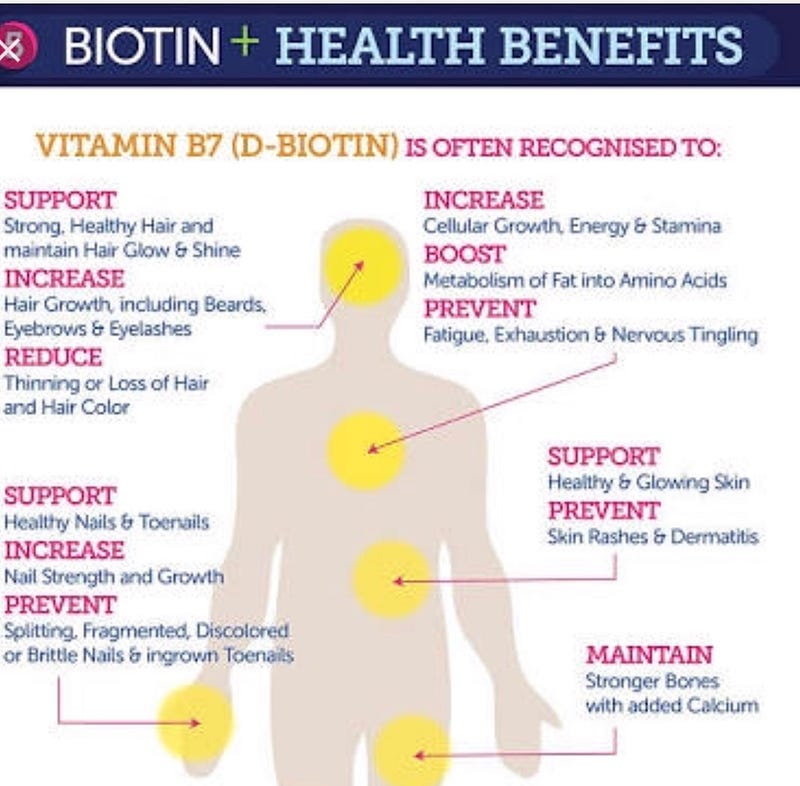HEALTH SUPPLEMENTS
What is biotin?
Also known as vitamin H, biotin is one of the B complex vitamins that help the body convert food into energy.
The word “biotin” comes from the ancient Greek word “biotos,” which means “life” or “sustenance.” B vitamins, and specifically biotin, help keep your skin, hair, eyes, liver, and nervous system healthy. Biotin is also a crucial nutrient during pregnancy, as it’s important for embryonic growth.
Most people get the biotin they need from eating a healthy diet, but there have been many claims that getting more biotin can regulate your blood sugar, promote healthy hair, skin, and nails, and help pregnant moms have healthier babies. How much biotin is enough, where can you get it, and what can it really do for you?
Recommended daily allowance
Between 30 and 100 microgram (mcg) per day of biotin is often recommended for adolescents and adults.
Because it’s water-soluble, extra biotin will simply pass through your body when you urinate. While most people can handle biotin supplements, some people report mild side effects like nausea and digestive issues. There are no known toxicity symptoms associated with too much biotin.
Supplements and diabetes
Some research, including this animal study, suggests that people with type 2 diabetes may benefit from taking biotin supplements to help regulate blood glucose levels. The research so far isn’t conclusive, however.
According to another study performed on animals, biotin may help prevent kidney damage in people with insulin-dependent type 1 diabetes. Again, more research is needed to support this.
Healthy hair, skin, and nails?
Biotin deficiencies are rare. But because people with a deficiency often show symptoms of hair loss or a scaly red rash, some doctors and supplement companies recommend increasing your intake.
However, the National Institutes of Health reports that there is insufficient data to support recommending supplementation.
Fetal development
Although rare, pregnant women may become biotin deficient. To help promote baby health, take a prenatal vitamin that contains biotin and folic acid during pregnancy. High doses of biotin, however, can be dangerous to the baby, so additional supplementation of biotin isn’t recommended.
Natural sources of biotin
Biotin can also be found in a number of foods, including:
- egg yolk
- organ meats (liver, kidney)
- nuts, like almonds, peanuts, pecans, and walnuts
- nut butters
- soybeans and other legumes
- whole grains and cereals
- cauliflower
- bananas
- mushrooms
Because food-processing techniques like cooking can render biotin ineffective, raw or less-processed versions of these foods contain more active biotin.
It’s always best to get nutrients from natural sources. If you’re unable to get enough biotin naturally, a supplement may be suggested by your doctor. Remember that supplements aren’t monitored by the FDA for safety, purity, dose, or quality, so research your brands before you buy.
The Takeaway
While biotin is necessary for normal body function, and supplements may help pregnant women and some people with diabetes, there still isn’t enough data available to support supplementation or claims about healthy hair, skin, or nails.
With that said, it’s always a good idea to eat a balanced, healthy diet of non processed or minimally processed foods for your optimal health.
Dr. Shivani Bhardwaj

Comments
Post a Comment